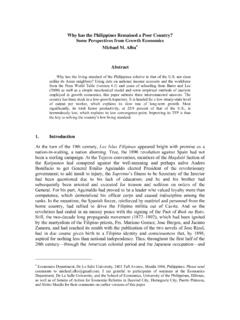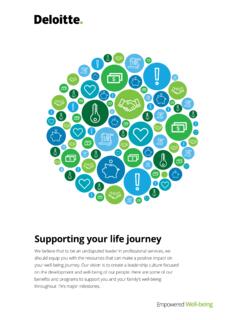Transcription of Biotechnology: Ethical and social debates - OECD
1 MULTI-DISCIPLINARY ISSUES. INTERNATIONAL FUTURES PROGRAMME. OECD International Futures Project on The Bioeconomy to 2030: Designing a Policy Agenda . Biotechnology: Ethical and social debates Report prepared by: Nicolas Rigaud February 2008. NOTE: This document is prepared on the responsibility of the authors. The opinions expressed and arguments employed herein do not necessarily reflect the official views of the OECD or of the governments of its Member countries. Contact persons: Anthony Arundel: +33 (0)1 45 24 96 25, David Sawaya: +33 (0) 1 45 24 95 92, OECD International Futures Programme 1/89.
2 TABLE OF CONTENTS. EXECUTIVE SUMMARY .. 5. INTRODUCTION .. 7. I. BIOTECHNOLOGY AND THE PUBLIC OPINION .. 7. II. GM CROPS AND GM FOOD .. 9. II. 1. PUBLIC OPINION: THE GMO 9. II. 2. PUBLIC debates .. 10. III. BIOMASS ENERGY AND BIOFUELS .. 14. III. OPINION .. 14. III. 2. Ethical debates .. 16. IV. BIOPROSPECTING .. 19. IV. 1. BIOPROSPECTING AND INDIGENOUS COMMUNITIES .. 19. IV. 2. DIFFICULTIES IN IDENTIFYING LEGITIMATE SPOKESPERSONS .. 21. V. TRANSGENIC AND CLONED ANIMALS AND THEIR WELFARE .. 22. V. 1. PUBLIC CONCERNS REGARDING ANIMAL WELFARE.
3 22. V. 2. PUBLIC REGULATION ISSUES .. 25. VI. PRIVATE GENETIC INFORMATION .. 26. VI. 1. PUBLIC OPINION .. 26. VI. 2 REGULATORY ASPECTS .. 29. VII. STEM CELL RESEARCH .. 30. VII. 1 GENERAL PUBLIC OPINION .. 30. VII. 2. INFLUENTIAL RELIGIOUS GROUPS .. 31. VII. 3. NON-RELIGIOUS ASSOCIATIONS .. 32. VII. 4. REGULATORY CONSIDERATIONS .. 33. ROADBLOCKS AND ACCELERATORS .. 35. GM CROPS AND FOOD .. 35. Roadblocks .. 35. Accelerators .. 36. 37. Accelerators .. 37. Roadblocks .. 37. BIOPROSPECTING .. 38. Accelerators .. 38. Roadblocks.
4 38. WELFARE OF CLONED AND TRANSGENIC ANIMALS .. 38. Accelerators .. 38. Roadblocks .. 39. USE OF GENETIC INFORMATION .. 39. Accelerators .. 39. Roadblocks .. 39. STEM CELL RESEARCH .. 40. Roadblocks .. 40. Accelerators .. 40. CONCLUSION .. 41. ANNEX A- NGOS AND THE MEDIA .. 44. NGOS AND THE MEDIA - PRIVATE GENETIC INFORMATION .. 44. NGOS AND THE MEDIA - GENETICALLY MODIFIED ORGANISMS .. 45. OECD International Futures Programme 2/89. NGOS AND THE MEDIA - WELFARE OF CLONED AND TRANSGENIC ANIMALS .. 46. NGOS AND THE MEDIA - BIOFUELS.
5 47. NGOS AND THE MEDIA - STEM CELL RESEARCH .. 48. ANNEX B- COUNTRY PROFILES .. 49. COUNTRY PROFILES - PRIVATE GENETIC INFORMATION .. 49. COUNTRY PROFILES - GENETICALLY MODIFIED ORGANISMS .. 59. COUNTRY PROFILES - WELFARE OF CLONED AND TRANSGENIC 69. COUNTRY PROFILES - STEM CELL RESEARCH .. 75. REFERENCES .. 81. OECD International Futures Programme 3/89. List of Abreviations AFM: Association Fran aise contre la myopathie (French Muscular Dystrophy Assocition). APC: Animal Procedures Committee (UK). BIO: Biotechnology Industry Organisation Bt-Cotton: Bacillus Thuringiensis cotton, a variety of GM cotton.
6 CBD: Convention on Biological Diversity CCNE: Comit Consultatif National d'Ethique (French National Advisory Ethics Committee). DOE: Department of Energy (USA). DPI: Disabled People International ELSI: Ethical , Legal and social Implications ES Cell research: Embryonic Stem Cell research FOE: Friends of the Earth GE: Genetically Engineered GM: Genetically Modified. GMO: Genetically Modified Organisms GuRT: Gene use Restriction Technology HGA: Human Genetics Alert ICBG: Internattional Cooperative Biodiversity Group ICMR: Indian Council of Medical Research IFPRI: International Food Policy Research Institute INSERM: Institut National de la sant et de la recherche m dicale ISE: International Society of Ethnobiology KRRS: Karnataka State Farmers' Association (India).
7 NIH: National Institutes of Health (USA). NGO: Non-governmental Organisation RAFI: Rural Advancement Foundation International TRIPS: Trade Related Aspects of Intellectual Property Rights UKDPC: United Kingdom's Disabled People's Council WWF: The World Wide Fund 3R Doctrine: Doctrine concerning the Refinement, Reduction and Replacement of animals in research. OECD International Futures Programme 4/89. Executive summary The development of biotechnology has triggered many Ethical and social reactions from the public opinion, the media and non-governmental organisations.
8 The aim of this document is to provide some insights into the Ethical concerns, dilemmas and trade-offs that have been expressed concerning biotechnology in the last ten years. The paper focuses on six objects from the agriculture, industry and health sectors, whose procurement, production, storage and use by biotechnology has raised general attention: genetically modified organisms, biofuels, natural genetic resources through bioprospecting, transgenic and cloned animals, private genetic information and stem cells. Specific examples and international comparisons are drawn from a vast geographical scope: Brazil, Canada, China, Denmark, Finland, France, Germany, India, Italy, Japan, Mexico, Norway, Sweden, the United Kingdom, and the United States have all hosted some Ethical debate, sometimes specific to these countries, other times shared by a more international public.
9 Some key elements can be identified: - The majority of the public is optimistic about the ability of biotechnology to improve our quality of life. There are, however, visible differences between global support when the aims are medical, moderate support when biotechnology aims at improving industry products, and low support or adverse positions against biotechnology used in agriculture. - In the EU, the low public support for genetically modified food is an exception as compared to generally positive attitudes regarding science, technology and biotechnological progress.
10 GM food is often seen as not useful, morally unacceptable and a risk for society. It remains unclear if technical progress could inspire more positive opinions. NGOs adverse positions, stemming from Ethical concerns on health and environmental safety issues, have been influential in the 1999 EU. moratorium on GM food and crops. The population from less-developed countries as India and China is interested in GM culture, perhaps less as a "humanitarian" means to "feed hungry people". than as an efficient tool chosen by farmers cooperating with industry to increase yield.















